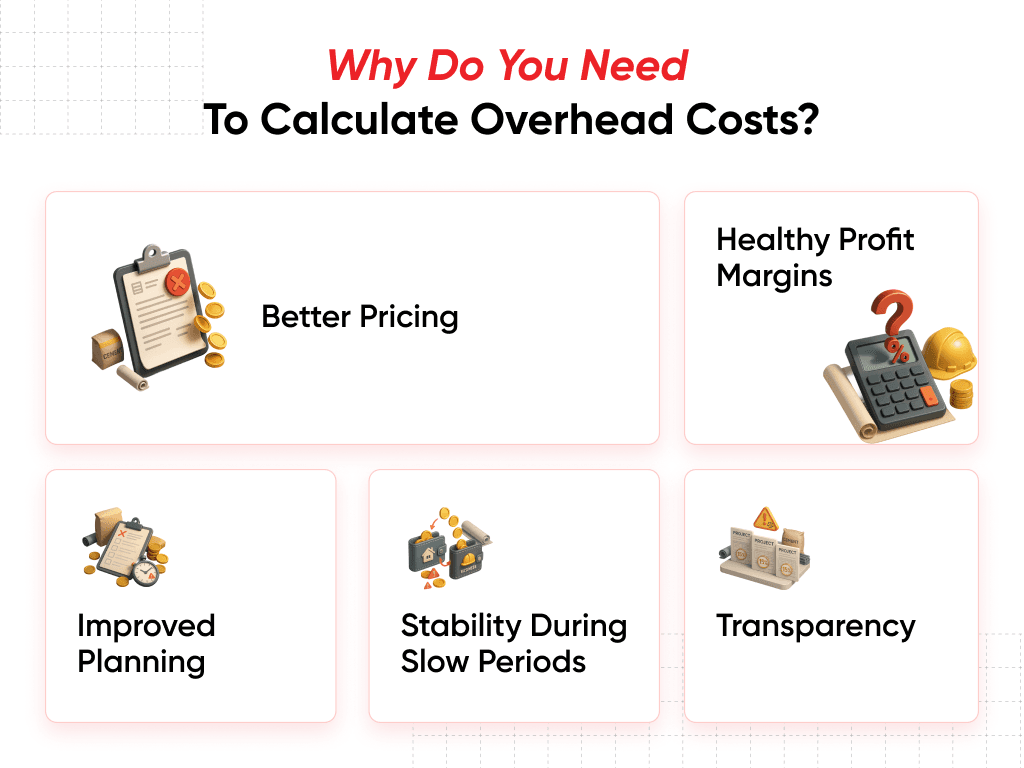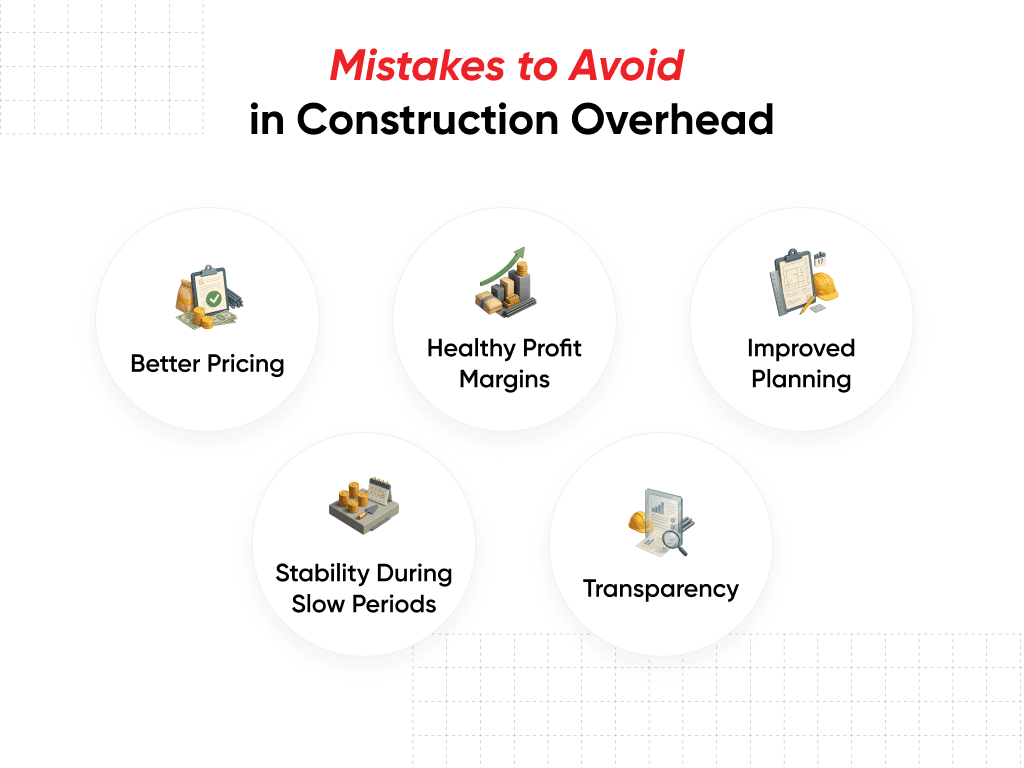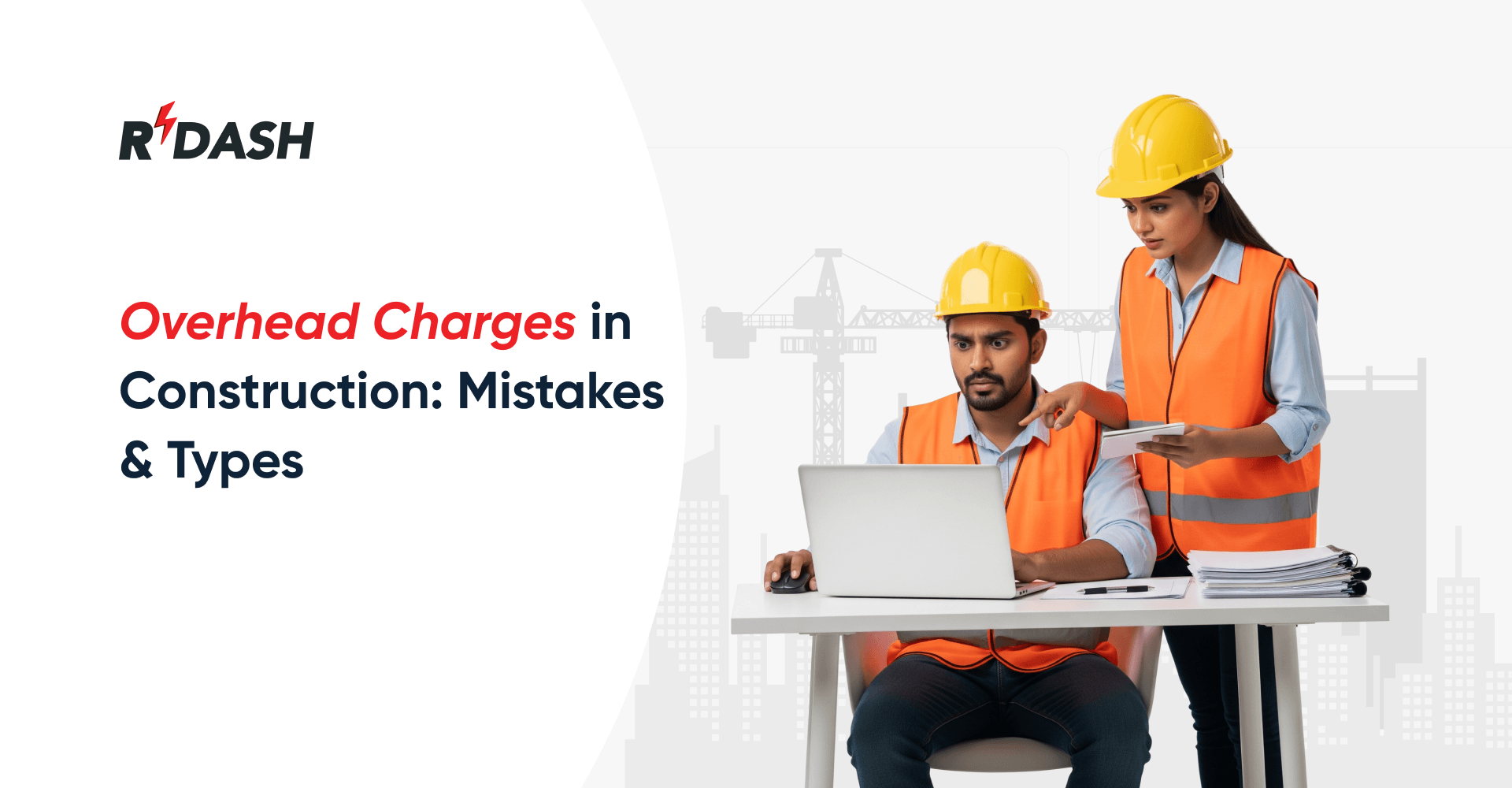What Are Overhead Charges in Construction?
Overhead charges in construction refer to all the indirect costs involved in completing a project. These are not directly tied to materials or labor used at the site but are still necessary for the project to run smoothly. Overhead expenses may cover costs like office space, employee wages, utilities, insurance, upkeep of equipment, and general administrative spending.
For example, the cost of running your company’s head office or paying your project manager’s salary is an overhead charge. These expenses don’t appear on-site but are still important for delivering any project on time and within budget.
How To Calculate Overhead Costs & Profit in Construction Projects
To calculate overhead and profit, construction companies usually follow a step-by-step process:
1. List All Overhead Costs
Start by listing all your indirect costs, such as:
- Office rent and utilities
- Admin and support staff salaries
- Legal and accounting fees
- Software subscriptions
- Vehicle fuel and maintenance
- Licenses and permits
- Insurance and taxes
2. Find the Total Overhead Amount
Add up all the costs you’ve listed. Let’s say your total overhead for the year is ₹20,00,000.
3. Estimate Annual Billable Work
Now calculate how much revenue you expect to generate from all active projects during the year. Suppose it’s ₹2,00,00,000.
4. Calculate Overhead Percentage
Divide the total overhead by the expected billable work, then multiply by 100 to get a percentage:
Overhead % = (Overhead Costs ÷ Billable Work) × 100
Overhead % = (20,00,000 ÷ 2,00,00,000) × 100 = 10%
This means your overhead cost is 10% of your total project value.
5. Add Profit Margin
Once you know your overhead percentage, add your desired profit margin to it. Let’s say you want a 15% profit. Your final markup becomes:
Markup = Overhead % + Profit %
Markup = 10% + 15% = 25%
So, to cover your overhead and earn profit, you need to quote at least 25% more than your direct costs.
Why Do You Need To Calculate Overhead Costs?
Many contractors ignore or underestimate overhead charges. But here’s why calculating them correctly is important:

1. Better Pricing
Knowing your overhead ensures you don’t underquote. It helps you price your projects in a way that covers all expenses.
2. Healthy Profit Margins
If you don’t account for overhead, your profits will shrink—even if your projects appear successful on paper.
3. Improved Planning
Keeping track of overhead allows you to control and organize your company’s spending more effectively. You can identify which costs are too high and take steps to reduce them.
4. Stability During Slow Periods
Even when work slows down, your overhead remains. By planning for these costs ahead of time, you can stay financially stable.
5. Transparency
Clients and investors prefer working with firms that understand and explain their cost structures clearly.
Types of Construction Costs and Expenses
In a construction project, costs are usually divided into two main categories: direct costs and indirect costs. Understanding the difference between them helps in proper budgeting and profit planning.
1. Direct Costs
These costs are linked to on-site activities and can be clearly assigned to a particular construction job.
- Labor wages for workers on-site
- Cost of raw materials like cement, steel, bricks
- Equipment rental used on that particular site
- Site-specific transport charges
- Subcontractor payments for project-related work
2. Indirect Costs (Overhead Costs)
These are costs that support the construction process but are not linked to any single project.
Examples include:
- Office rent and utility bills
- Staff salaries (HR, accounts, admin)
- Company vehicles
- Software tools and licenses
- Insurance and taxes
- Phone, internet, and communication costs
Both direct and indirect costs must be calculated properly to ensure the project is profitable and the business remains sustainable.
Mistakes to Avoid in Construction Overhead
Incorrect handling of overhead costs can hurt both your profits and your reputation. Let’s look at some frequent errors construction firms should steer clear of:

1. Ignoring Overhead in Project Bids
Many contractors focus only on direct costs while bidding for projects. This leads to underquoting and losses, especially in long-term projects.
2. Guessing Overhead Percentage
Using rough estimates instead of actual data can result in incorrect pricing. Always base your overhead calculation on real expenses.
3. Not Tracking Overhead Monthly
Overhead costs may change over time. If you only check them once a year, you might miss rising costs like rent hikes or salary increases.
4. Mixing Personal and Business Expenses
Using business funds for personal costs (or vice versa) makes it hard to track real overhead.
5. Applying the Same Overhead Rate to All Projects
Every project is different. Applying a flat overhead percentage to every project might make some projects overpriced and others underpriced.
How To Reduce Your Overhead Costs
Cutting overhead doesn’t mean cutting quality. It means running your business smarter. Here are some practical ways to reduce overhead in construction:
1. Automate Repetitive Tasks
Use software tools to automate paperwork, expense tracking, and approvals. This reduces admin staff time and errors.
2. Review Office Expenses Regularly
Look for areas to save – like switching to cheaper internet providers or shifting to smaller office spaces if staff work remotely.
3. Outsource When Needed
Instead of hiring full-time staff for every role, outsource tasks like accounting, HR, or IT support.
4. Use Digital Communication Tools
Cut down on travel and phone bills by using apps for site updates, meetings, and daily reports.
5. Track Time and Workloads
Avoid overstaffing by keeping a record of who is doing what. This helps reduce idle time and saves money on salaries.
6. Train Staff to Be Cost-Aware
Educate your team to avoid wastage, plan better, and treat company expenses like their own.
7. Buy in Bulk Where Possible
For materials or office supplies that you use regularly, buying in bulk can reduce cost per unit.
FAQs
1. What are overhead charges in construction?
Overhead charges are indirect expenses like office rent, admin salaries, and software costs that support construction projects but aren’t directly tied to the job site.
2. Are overhead costs the same for every project?
No, overhead costs can vary based on the project size, duration, location, and your company’s operating style.
3. How do I know if I’m charging the right overhead percentage?
Review your total annual indirect expenses and divide by your total billable work to get an accurate percentage. Adjust it based on current financial data.
4. What happens if I don’t include overhead in my project cost?
You may underquote, lose profit, or even end up in loss – especially in long-term projects where overhead adds up over time.
5. Can I reduce overhead without affecting quality?
Yes, by using technology, outsourcing smartly, and reviewing expenses regularly, you can reduce costs without compromising on quality.
6. Is profit included in overhead?
No, profit is separate. First calculate your overhead, then add your desired profit margin to set the final price.
7. How often should I review my overhead costs?
Ideally, review them every quarter or at least twice a year to stay updated with changing costs.
Next Read: Construction Resource Management Process Explained





